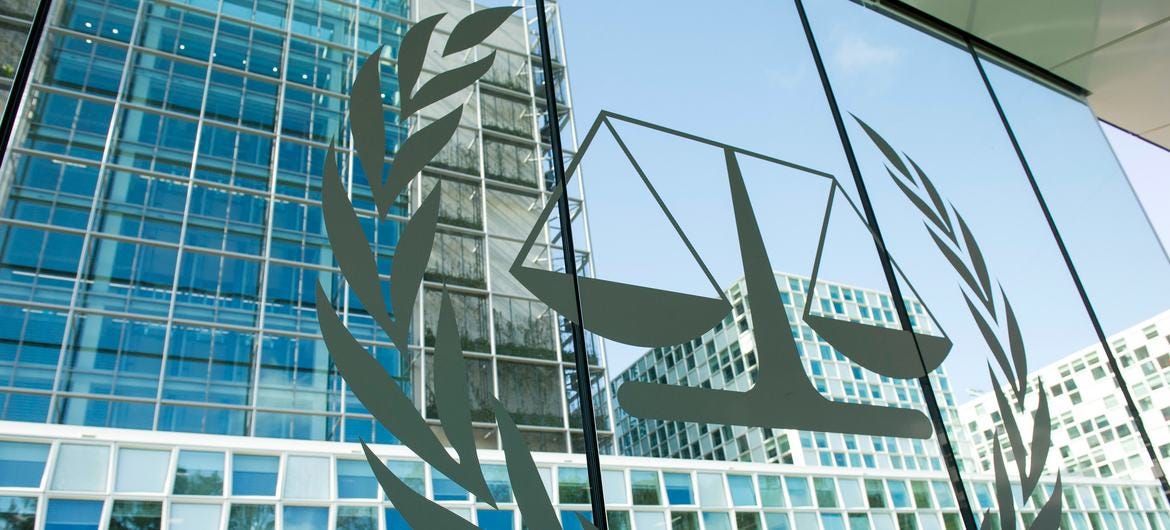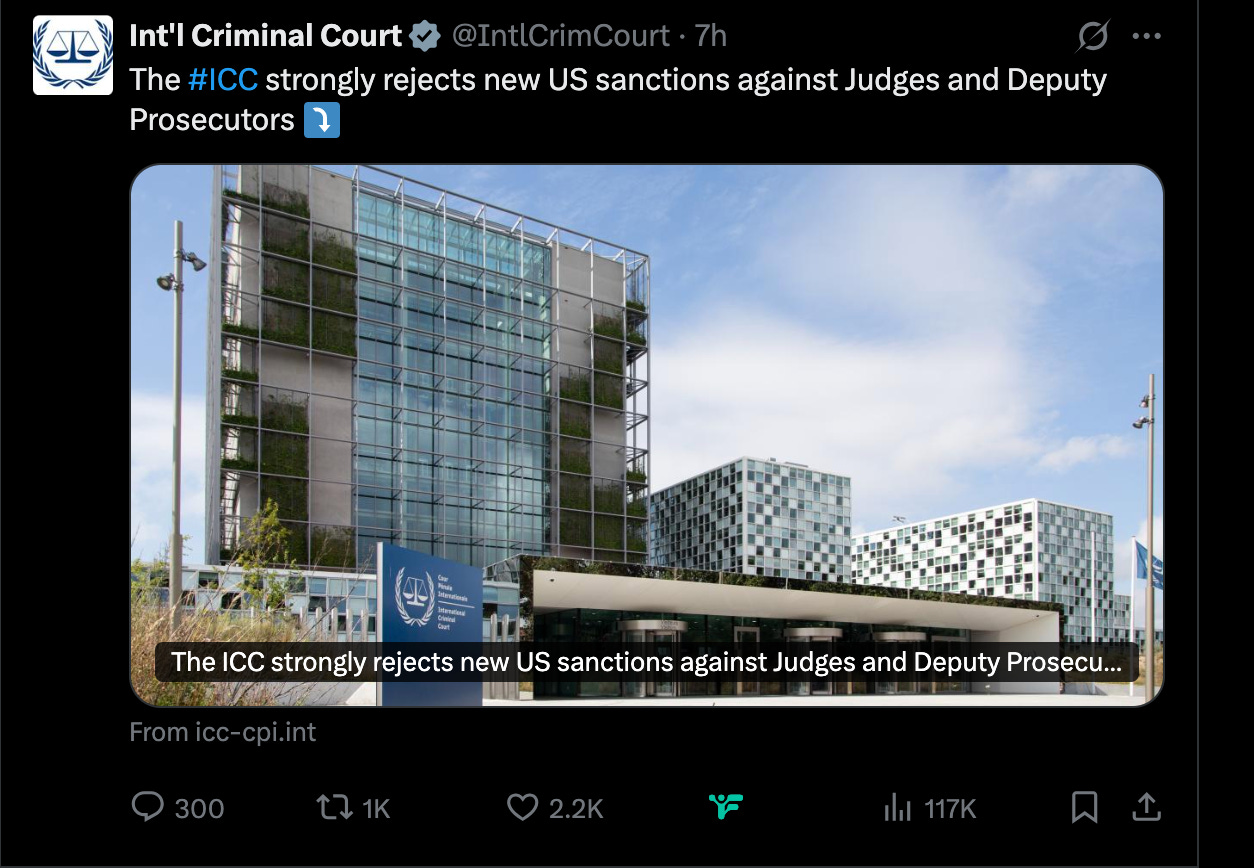US Imposes New Sanctions on International Criminal Court Officials Over Israel, US Investigations
Today’s email is brought to you by Empower your podcasting vision with a suite of creative solutions at your fingertips.
The United States announced new sanctions Wednesday against four additional International Criminal Court personnel, escalating pressure on the tribunal over its investigations into alleged war crimes by American and Israeli officials.
The sanctions target Canadian Judge Kimberly Prost, French Judge Nicolas Guillou and deputy prosecutors Nazhat Shameem Khan of Fiji and Mame Mandiaye Niang of Senegal, according to the court's announcement.
The measures represent the second wave of U.S. sanctions against ICC personnel, following earlier restrictions imposed on four other judges and the court's prosecutor in response to arrest warrants issued against Israeli officials.
Secretary of State Marco Rubio justified the sanctions by characterizing the ICC as "a national security threat that has been an instrument for lawfare against the United States and our close ally Israel."
Truth matters. Quality journalism costs.
Your subscription to Mencari directly funds the investigative reporting our democracy needs. For less than a coffee per week, you enable our journalists to uncover stories that powerful interests would rather keep hidden. There is no corporate influence involved. No compromises. Just honest journalism when we need it most.
Not ready to be paid subscribe, but appreciate the newsletter ? Grab us a beer or snag the exclusive ad spot at the top of next week's newsletter.
The International Criminal Court strongly rejected the sanctions, calling them "a flagrant attack against the independence of an impartial judicial institution."
The court said the sanctions "constitute also an affront against the Court's States Parties, the rules-based international order and, above all, millions of innocent victims across the world."
The escalating confrontation stems from ICC investigations into alleged war crimes in Gaza and Afghanistan, including potential charges against Israeli and American officials.
In November, the ICC issued arrest warrants for Israeli Prime Minister Benjamin Netanyahu and former Defense Minister Yoav Gallant, along with a former Hamas commander, citing allegations of war crimes and crimes against humanity connected to the Gaza conflict.
The court also continues investigating alleged war crimes committed in Afghanistan by all parties during years of conflict, including potential charges against U.S. personnel following the 2003 allied invasion.
Neither the United States nor Israel are parties to the Rome Statute, the 1998 treaty that established the ICC and governs its operations. The treaty has been ratified by 125 countries, giving the court jurisdiction over crimes committed on their territories or by their nationals.
The ICC, based in The Hague, investigates genocide, war crimes, crimes against humanity and crimes of aggression when national courts are unwilling or unable to prosecute such cases.
Despite the sanctions pressure, the court pledged to continue its work without interference.
"The Court stands firmly behind its personnel and victims of unimaginable atrocities and will continue fulfilling its mandates, undeterred, in strict accordance with its legal framework as adopted by the States Parties and without regard to any restriction, pressure or threat," the ICC stated.
The court called on member states and supporters of international law to provide "firm and consistent support to the Court and its work carried out in the sole interest of victims of international crimes."
United Nations officials expressed concern about the expanded sanctions and their impact on international justice mechanisms.
"The decision imposes severe impediments on the functioning of the office of the prosecutor and respect for all the situations that are currently before the court," UN Spokesman Stéphane Dujarric told journalists in New York.
Dujarric emphasized that "judicial independence is a basic principle that must be respected, and these types of measures undermine the foundation of international justice."
The sanctions typically include asset freezes and travel restrictions on targeted individuals, though specific details of the measures were not immediately disclosed.
The ICC operates independently from the United Nations but maintains close cooperation with UN bodies on international justice matters.
The court's jurisdiction extends to situations where crimes are committed on the territory of member states or by nationals of member states, regardless of whether the accused person's home country has ratified the Rome Statute.
This principle has enabled ICC investigations into actions by Israeli officials in Palestinian territories, as Palestine became a member state in 2015, and into U.S. actions in Afghanistan, which ratified the treaty in 2003.
The November arrest warrants for Netanyahu and Gallant marked the first time the ICC has issued warrants against leaders of a close U.S. ally, intensifying American opposition to the court's work.
The warrants require all 125 member states to arrest the individuals if they enter their territories, effectively restricting their international travel.
The Trump administration previously imposed sanctions on ICC officials in 2020 over Afghanistan investigations, measures that were later lifted by the Biden administration in 2021.
The renewed sanctions under the current administration reflect continued bipartisan U.S. opposition to ICC jurisdiction over American personnel and allies.
Congressional legislation has long prohibited U.S. cooperation with ICC investigations and authorizes measures to protect American service members from prosecution.
The court has faced similar pressure from other countries whose officials have been investigated, but the U.S. sanctions represent the most significant challenge to its independence since its establishment.
ICC member states have generally supported the court's work despite external pressure, viewing it as essential to international accountability for mass atrocities.
The court currently has ongoing investigations and preliminary examinations in multiple countries across Africa, Asia, Europe and the Middle East.
Recent ICC cases have resulted in convictions for war crimes and crimes against humanity in conflicts in Democratic Republic of Congo, Central African Republic, Mali and other countries.
The sanctions announcement comes amid broader tensions over international justice mechanisms and growing challenges to multilateral institutions.
European Union officials have previously criticized U.S. sanctions against ICC personnel as undermining international law and judicial independence.
The ICC's founding treaty entered force in 2002 after years of negotiations following international tribunals for former Yugoslavia and Rwanda demonstrated the need for a permanent international criminal court.
The court operates on a complementarity principle, intervening only when national courts are genuinely unwilling or unable to investigate and prosecute international crimes.
Despite lacking enforcement mechanisms, ICC arrest warrants carry significant political and diplomatic weight, often restricting the international movement of accused individuals.
The expanding sanctions underscore the continuing tension between national sovereignty claims and international accountability mechanisms designed to address mass atrocities.
The court maintains that its investigations proceed based solely on legal evidence and standards, without regard to political considerations or external pressure from any government.
Got a News Tip?
Contact our editor via Proton Mail encrypted, X Direct Message, LinkedIn, or email. You can securely message him on Signal by using his username, Miko Santos.
Sustaining Mencari Requires Your Support
Independent journalism costs money. Help us continue delivering in-depth investigations and unfiltered commentary on the world's real stories. Your financial contribution enables thorough investigative work and thoughtful analysis, all supported by a dedicated community committed to accuracy and transparency.
Subscribe today to unlock our full archive of investigative reporting and fearless analysis. Subscribing to independent media outlets represents more than just information consumption—it embodies a commitment to factual reporting.
As well as knowing you’re keeping Mencari (Australia) alive, you’ll also get:
Get breaking news AS IT HAPPENS - Gain instant access to our real-time coverage and analysis when major stories break, keeping you ahead of the curve
Unlock our COMPLETE content library - Enjoy unlimited access to every newsletter, podcast episode, and exclusive archive—all seamlessly available in your favorite podcast apps.
Join the conversation that matters - Be part of our vibrant community with full commenting privileges on all content, directly supporting The Evening Post (Australia)
Catch up on some of Mencari’s recent stories:
It only takes a minute to help us investigate fearlessly and expose lies and wrongdoing to hold power accountable. Thanks!








